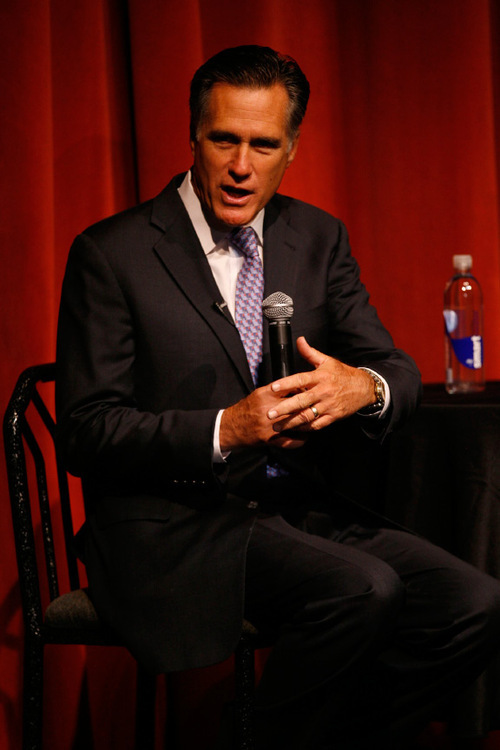This is an archived article that was published on sltrib.com in 2011, and information in the article may be outdated. It is provided only for personal research purposes and may not be reprinted.
Amid the prospect of presidential runs by Jon Huntsman Jr. and Mitt Romney, reporters are bombarding the LDS Church with calls about the potential candidates and their Mormon faith.
So much so, in fact, that the Utah-based Church of Jesus Christ of Latter-day Saints decided it needed to reiterate its longstanding stance of political neutrality.
"The church is strictly neutral in matters of party politics and will not comment at all on the personalities and platforms of candidates, whether or not they are members of the church and irrespective of their party affiliation," said a statement posted this week on the church's newsroom blog.
The novelty of two high-profile members possibly competing for the nation's highest office guarantees the 14 million-member faith a place in the national spotlight. But experts are divided about whether that would help or hurt the church and how much of a factor Mormonism would be in either potential campaign.
"In the long run, it would be good for the church," said David Campbell, a political scientist at the University Notre Dame and a Mormon. "It would mean we were entering the mainstream of American society. After all, we would have not just one but two candidates — plus Harry Reid [the Senate majority leader, a Democrat from Nevada]."
A Huntsman candidacy, Campbell said, would "totally change the dynamic of the way Mormonism is discussed."
For example, if Republicans Huntsman and Romney disagreed about issues, as they no doubt would, said Campbell, co-author of American Grace: How Religion Divides and Unites Us, that would undermine the view that "Mormonism is monolithic, that members all march in lockstep."
Campbell and co-author Robert Putnam collected data in 2007 and 2008 ranking Mormonism among the nation's least-popular faiths.
Romney's first run at the White House "did not change attitudes toward Mormons, either among those who liked him or didn't," Campbell said. "Attitudes about Mormonism were fixed."
John Green, an expert in religion and politics at the University of Akron in Ohio, agrees.
"If we have two Mormon candidates in the race, [Mormonism] becomes less of an anomaly," Green said. "You may see somewhat greater acceptance [of Mormons] on the part of the general public."
Still, though the political context may have changed from the 2008 campaign, he said, the same underlying attitudes that created difficulties for Romney remain.
Mormonism continues to be among the least popular religions in America, he said, and white evangelical Protestants — a force in the GOP — view the faith's doctrines with suspicion and its missionaries as "competitors" for converts.
White evangelicals are especially influential in states such as South Carolina, Georgia and Florida, Green said, and would pose a large hurdle for any LDS candidate.
Huntsman, who has described himself as not "overly religious," may face different opposition from Americans, especially Republicans, Green said, "who like religious candidates who take their faith seriously."
Kelly Patterson, a Brigham Young University political scientist, is more optimistic about his church and possible Mormon candidates.
Patterson acknowledges religion played heavily in the previous Romney campaign, partly because the former Massachusetts governor portrayed himself as a religious individual.
With that strategy, Romney invited some of the scrutiny of his faith, Patterson said. "The second time around, it won't be as important."
Politicians such as Romney can be very "adaptive," he said. They learn how to frame issues in different ways and often do a better job of controlling the narrative. Over time, constituents come to feel more comfortable with those candidates and trust them more.
"Clearly, with some elements of the Republican Party and the media," Patterson said, "there is a level of familiarity and understanding of Mormonism that didn't exist in 2008 cycle."
The BYU political scientist wonders if Romney will follow a similar strategy in a 2012 campaign — and if Huntsman learned anything by watching him.
"Jon Huntsman may not want money and volunteers from the LDS community like Governor Romney had," Patterson said. "He may identify an entirely different set of core supporters."



